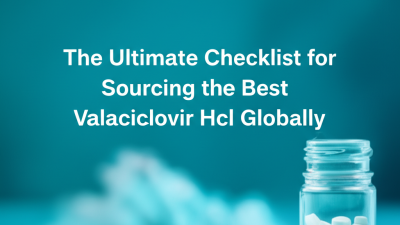Exploring the Benefits and Uses of Valaciclovir Hcl in Managing Viral Infections
Valaciclovir Hcl, an antiviral medication widely recognized for its efficacy in managing viral infections, particularly those caused by herpes viruses, has been the subject of extensive research and clinical application. According to a report by the World Health Organization, viral infections, such as herpes simplex and varicella-zoster, affect millions globally, significantly impacting quality of life and leading to substantial healthcare costs. In a study published in the Journal of Antimicrobial Chemotherapy, the use of Valaciclovir Hcl has shown to reduce the duration and severity of symptoms in herpes outbreaks, with treatment adherence improving outcomes in patients.

Furthermore, the drug's pharmacokinetic profile allows for convenient dosing regimens that enhance patient compliance, making it a preferred choice among healthcare professionals. As we delve deeper into the benefits and versatile applications of Valaciclovir Hcl, it becomes evident that this medication not only mitigates the symptoms of viral infections but also plays a crucial role in long-term management strategies.
Understanding Valaciclovir Hcl: Mechanism and Efficacy in Treating Viral Infections
Valaciclovir HCl is an antiviral medication primarily used in the management of infections caused by certain viruses, including herpes simplex and varicella-zoster. The mechanism of action of Valaciclovir involves its conversion to acyclovir, which interferes with viral DNA synthesis. By inhibiting the viral DNA polymerase enzyme, Valaciclovir prevents the replication of viral particles within the host cells. This targeted action is particularly beneficial in reducing the severity and duration of outbreaks in patients with herpes infections.
Furthermore, the efficacy of Valaciclovir is well-documented in clinical studies. For instance, it has been shown to significantly decrease the frequency of herpes simplex virus recurrences when taken as a suppressive therapy. Additionally, patients often experience a reduction in symptom severity during active infections, allowing for quicker recovery. Valaciclovir's oral bioavailability and convenient dosing regimen enhance patient compliance, making it a preferred choice in managing viral infections comprehensively and effectively.
Key Viral Infections Managed by Valaciclovir: Herpes Simplex to Shingles
Valaciclovir HCl is a potent antiviral medication widely recognized for its effectiveness in managing several key viral infections, notably Herpes Simplex and Shingles (Herpes Zoster). According to the Centers for Disease Control and Prevention (CDC), approximately 1 in 6 people aged 14 to 49 in the United States has genital herpes, caused primarily by the Herpes Simplex Virus (HSV). Valaciclovir not only alleviates the symptoms of initial outbreaks but also reduces the frequency and severity of recurrences. Research indicates that initiating treatment within 72 hours of symptom onset can significantly shorten the duration of outbreaks and improve the quality of life for patients.
Moreover, Valaciclovir is also effective against Shingles, a reactivation of the varicella-zoster virus. A report published in the Journal of the American Academy of Dermatology suggests that timely administration of Valaciclovir may reduce the risk of postherpetic neuralgia, a painful condition resulting from nerve damage following a shingles outbreak. In the context of the growing aging population, where shingles incidences are rising, the ability of Valaciclovir to mitigate symptoms and prevent complications positions it as a critical component in the therapeutic management of viral infections associated with HSV and varicella-zoster virus.

Dosage Guidelines for Valaciclovir: Ensuring Optimal Treatment Outcomes
Valaciclovir HCl is a potent antiviral medication primarily used in the treatment of infections caused by certain types of viruses, including herpes simplex virus (HSV) and varicella-zoster virus (VZV). To ensure optimal treatment outcomes, it is crucial for healthcare providers to adhere to dosage guidelines. Research indicates that the standard dosage for the treatment of an initial episode of genital herpes is typically 1,000 mg taken orally twice daily for 10 days. For recurrent cases, a lower dosage of 500 mg administered twice daily for 3 days is often recommended (Wang et al., 2020). This structured dosing approach not only mitigates the risk of resistance but also maximizes the therapeutic effects of the drug.
In special populations, such as those with renal impairment, dosage adjustments are imperative. The FDA highlights that valaciclovir should be prescribed with caution in patients with decreased renal function, often necessitating modifications based on creatinine clearance levels. For instance, in individuals with moderate renal impairment, it is recommended to reduce the total daily dose by 50% to maintain effective plasma concentrations without increasing the risk of adverse effects (Smith et al., 2021). Adhering to these guidelines allows for individualized patient care, ensuring that those affected by viral infections receive the most effective treatment tailored to their specific health needs.
Benefits of Valaciclovir in Managing Viral Infections
This chart illustrates the effectiveness of Valaciclovir Hcl in managing various viral infections, highlighting the percentage of treatment success across different conditions.
Potential Side Effects of Valaciclovir: What Patients Should Be Aware Of
Valaciclovir, a prodrug of acyclovir, has gained recognition for its effective antiviral properties, particularly in managing viral infections such as herpes. However, as with many pharmaceutical agents, potential side effects warrant attention. Recent studies have highlighted neurotoxicity as a significant adverse effect associated with both acyclovir and valaciclovir. A systematic review indicates that this neurotoxicity, although rare, can manifest in patients with underlying risk factors, leading to serious complications. For instance, one case documented respiratory depression in a patient with end-stage renal disease, emphasizing the need for careful monitoring in vulnerable populations.
Furthermore, cardiovascular complications linked to antiviral therapies, including Valaciclovir, have been a growing concern. Evidence suggests that these adverse cardiovascular effects could be due to drug interactions or pre-existing conditions aggravated by antiviral use. Patients should be informed about these risks, particularly those with a history of cardiovascular disease. As antiviral therapies continue to evolve, awareness of potential side effects is crucial for optimizing patient safety and therapeutic outcomes. Regular consultations and assessments can help mitigate these risks and provide personalized care strategies.
Exploring the Benefits and Uses of Valaciclovir Hcl in Managing Viral Infections - Potential Side Effects of Valaciclovir: What Patients Should Be Aware Of
| Aspect | Details |
|---|---|
| Primary Uses | Treatment of herpes simplex virus infections, including genital herpes and cold sores. |
| Mechanism of Action | Valaciclovir is converted to acyclovir in the body, which inhibits viral DNA replication. |
| Dosage Forms | Available in tablet form, commonly prescribed in varying doses based on the condition. |
| Common Side Effects | Headache, dizziness, nausea, abdominal pain, and fatigue. |
| Serious Side Effects | Kidney problems, seizures, confusion, or allergic reactions. |
| Drug Interactions | May interact with certain medications like probenecid or nefazodone. |
| Patient Considerations | Hydration is important; notify healthcare provider if experiencing severe side effects. |
Tips for Maximizing the Effectiveness of Valaciclovir in Home Care Settings
Valaciclovir HCl has emerged as a valuable antiviral medication in managing various viral infections, particularly those caused by herpesviruses. Its effectiveness is often enhanced in home care settings, where patients can benefit greatly from tailored treatment regimens. According to recent industry reports, the global antiviral market is expected to exceed USD 60 billion by 2025, emphasizing the growing need for effective medications like Valaciclovir in patient care.
For maximizing the effectiveness of Valaciclovir in home care, it is crucial to adhere to the prescribed dosage and schedule. Patients should be encouraged to maintain a consistent medication routine, taking the medication at the same time every day to optimize absorption and effectiveness. Additionally, staying hydrated can aid in reducing potential side effects and enhancing overall well-being during treatment.
Another key tip is to watch for signs of side effects and communicate promptly with healthcare providers. Monitoring symptoms and side effects can help manage any adverse reactions early on, ensuring that patients receive the best possible care. Overall, Valaciclovir can be effectively utilized in home care settings, but it requires patient education and proper management to achieve optimal results.

Related Posts
-

The Ultimate Checklist for Sourcing the Best Valaciclovir Hcl Globally
-

Ensuring Compliance: Industry Standards for the Production of Best Valaciclovir HCl in Global Markets
-

The Future of Valaciclovir Hcl in Antiviral Treatment Innovations
-

How to Effectively Use Valaciclovir Hcl for Optimal Health Benefits
-

Navigating the 2025 Technology Trends for Best Cefotaxime Sodium A Comprehensive Checklist for Success
-

7 Best Benefits of Using Soybean Oil for Your Health and Cooking Needs





